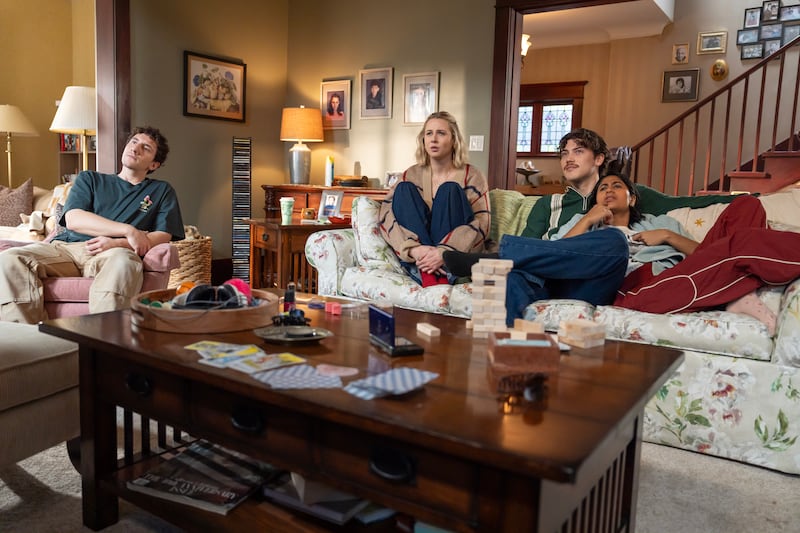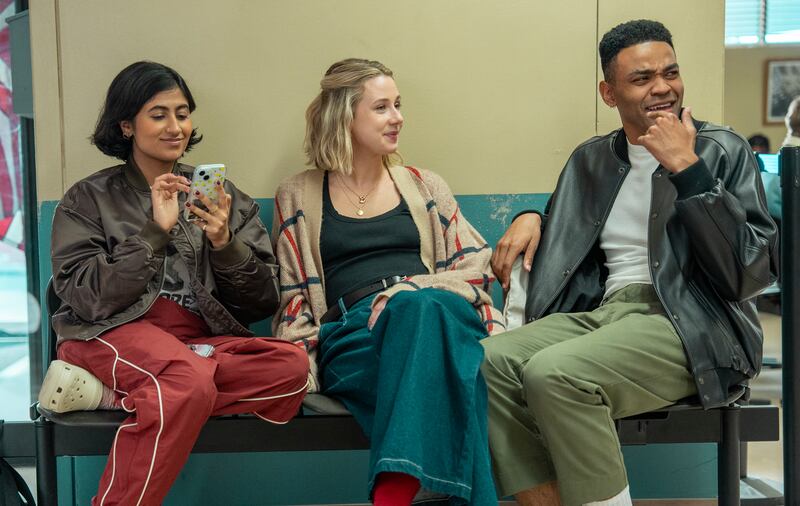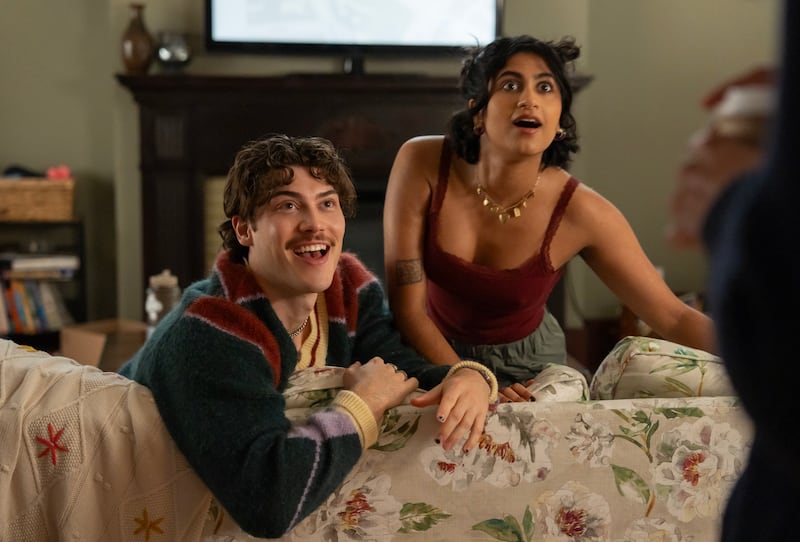The comedy-drama Girls premiered about 14 years after its HBO ancestor Sex and the City and it certainly felt informed by its predecessor, even (or especially) as the newer show pointedly diverged from the older one’s hallmarks.
Now, a similar amount of time has elapsed since Girls first aired, and it’s harder to detect the latter’s influence on subsequent zeitgeist-y programs.
That may be a reflection of the increasing niche space that even buzzy TV shows occupy, or the fact that Girls ultimately bore more of a resemblance to the incisive short-story style of Mad Men than the fizzy soul-searching of Sex and the City. Regardless, every generation deserves some funny but unsparing stories about young adults coming into their own (or not), in the vein of Girls or Insecure.
The new FX comedy series Adults takes a shot at providing that for, you guessed it, Gen Z—most members of which were born during that decade and a half between Sex and Girls.
The set-up for Adults, which premieres May 28, would have once been considered classic multi-cam sitcom fodder.
Samir (Malik Elassal), an Queens native in his early twenties, has the run of his parents’ outer-borough house while they embark on a lengthy, open-ended RV trip, and brings in three friends to share the space: his high school pal Billie (Lucy Freyer), a wannabe journalist/writer in the Hannah Horvath mode; Issa (Amita Rao), a sexually confident sorta-libertine in the style of Broad City‘s Ilana; and Anton (Owen Thiele), characterized in one episode as a “friend slut” for his go-girl rapport with nearly everyone he meets. Eventually Paul Baker (Jack Innanen), Issa’s sort-of boyfriend who everyone (including Issa) calls by his full first and last name, moves in too; the only thing missing is a laugh track.

The lack of one means that Adults can move at the speed of a more contemporary, joke-heavy New York sitcom like 30 Rock or Broad City, though it doesn’t bend reality with the Simpsons-adjacent cartooniness of either of those classics. Adults, created by Tonight Show writing partners Ben Kronengold and Rebecca Shaw, also lacks a real relationship with New York, to the point where setting it there is a little confusing.
It’s funny, even wistfully nostalgic, that this tight, oversharing friend group bunks together in Samir’s childhood home as if on an endless sleepover, and interesting to see a New York-set show where the characters actually inhabit a more domesticated neighborhood. Yet in the first six episodes, there are surprisingly few storylines that even require a big-city setting, much less take advantage of one. One is set mostly in a hospital; another centers around a dinner party; one storyline involves Billie reconnecting with an old teacher. (Unsurprisingly, the show was not shot in the city.)
The lack of urban specificity isn’t a major issue, but it does contribute to the feeling that Adults isn’t just about characters in their early twenties doing a comically imperfect imitation of grown-up life; it’s also a show that sometimes feels as if it’s pantomiming that fumbling-young-adult experience.

Line for line, minute for minute, the show is often funny in its details (Anton, one of the most gainfully employed of the group, works from home in a way that requires constant virtual-meeting attendance but seemingly little actual work), dialogue, and performances. Rao is particularly funny as a self-styled world-beater who barges into situations she’s obliviously ill-equipped to handle, and Thiele nails a certain kind of quickly discarded New York intimacy.
But for all its watchable strengths, the show often turns cacophonous. Characters spiral quickly and easily, the frantic screw-ups always happening at a dizzying farcical pace that tries to hop over any building blocks. There’s an always-on comedy-writer relentlessness to the whole enterprise that keeps the homey vibes from ever feeling genuinely lived-in.

Granted, Adults isn’t aiming for Girls-level insight into its characters. But it’s also not precisely satirizing them, either, despite hitting the ground running toward caricature levels that a normal sitcom might not reach until season three or four.
Below the motormouthed oversharing and inability to define the word “waft,” there’s a thorny sense of generational isolationism, something the show doesn’t seem ready to connect to the 2020s pandemic, instead chalking it up more to friend-group insularity. As a result, the show’s comedy-first tactics can come across like nervous avoidance. The laugh lines are often well-crafted, but the show itself still feels—perhaps appropriately—unformed.
The post New Series ‘Adults’ Is Basically Gen Z’s Version of ‘Girls’ appeared first on The Daily Beast.




